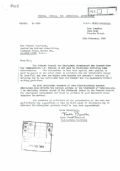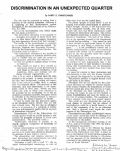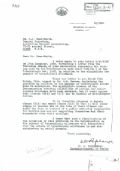The tuberculosis allowance campaign
In July 1963 Kath Walker, Queensland state secretary of the Federal Council for Aboriginal Advancement (FCAA), asked the General Secretary, Stan Davey, to find out why Aboriginal tuberculosis (TB) patients in Queensland were not receiving Commonwealth support. The Commonwealth had introduced a tuberculosis allowance so that people who contracted tuberculosis could recuperate without going back to work and spreading infection. Davey passed the issue to Dr Barry Christophers, convenor of the newly formed FCAA committee, Equal Wages for Aborigines. A medical practitioner, Christophers began investigating and found that there was a clause in the Tuberculosis Act which excluded 'aborigines and people of mixed blood who prior to their illness, did not support themselves and their dependents (if any) from their earnings'. This clause contradicted another clause in the Tuberculosis Act which stated that the allowance should be paid to an eligible applicant, 'irrespective of nationality or racial origin'.
Joe McGinness worked with Christophers, collecting evidence of discrimination against Aboriginal and Islander TB patients in Queensland. He visited the tuberculosis wards up and down the Queensland coast and collected details on more than 20 Aboriginal patients who were sick with TB but were not receiving the allowance.
This led to a vigorous 18-month campaign. The New South Wales state secretary of FCAA, Faith Bandler, wrote to the Australian Medical Association, pointing out the discrimination on racial grounds. Barry Christophers wrote to federal ministers for health and social services, state governors, the Australian Medical Association and leading health professionals, pressing for the racially discriminatory clause in the Tuberculosis Act to be removed. He also wrote to the Medical Journal of Australia and to Smoke Signals, to inform doctors and the general public of the situation.
Faith Bandler to the Australian Medical Association, 18 February 1964
Australian Medical Association Papers, Canberra
More info on Faith Bandler to the Australian Medical Association, 18 February 1964
In February 1965, after a campaign that targeted members of Parliament - bureaucrats, doctors and even the Governor-General who was the patron of the Tuberculosis Association, the Director-General of Health announced that a decision had been taken. The specific reference to 'aborigines and people of mixed blood' was to be deleted from the Act. This was the first victory for the Equal Wages for Aborigines Committee of FCAA. [1]
Director-General of Health to Australian Medical Association, December 1964
Australian Medical Association papers, Canberra
More info on Director-General of Health to Australian Medical Association, December 1964
Related resources
Further reading
Sue Taffe, 'Health, the law and racism: the campaign to amend the discriminatory clauses in the Tuberculosis Act', Labour History, no. 76, May 1999, pp 41-58.
Sue Taffe, Black and White Together: FCAATSI, the Federal Council for thr Advancement of Aborigines and Torres Strait Islanders, University of Queensland Press, Brisbane, 2005.
People
Faith Bandler
Barry Christophers
Stan Davey
Joe McGinness
Kath Walker
Organisation
Federal Council for Aboriginal Advancement
Footnotes
1 Barry Christophers Papers, MS 7992, National Library of Australia.


